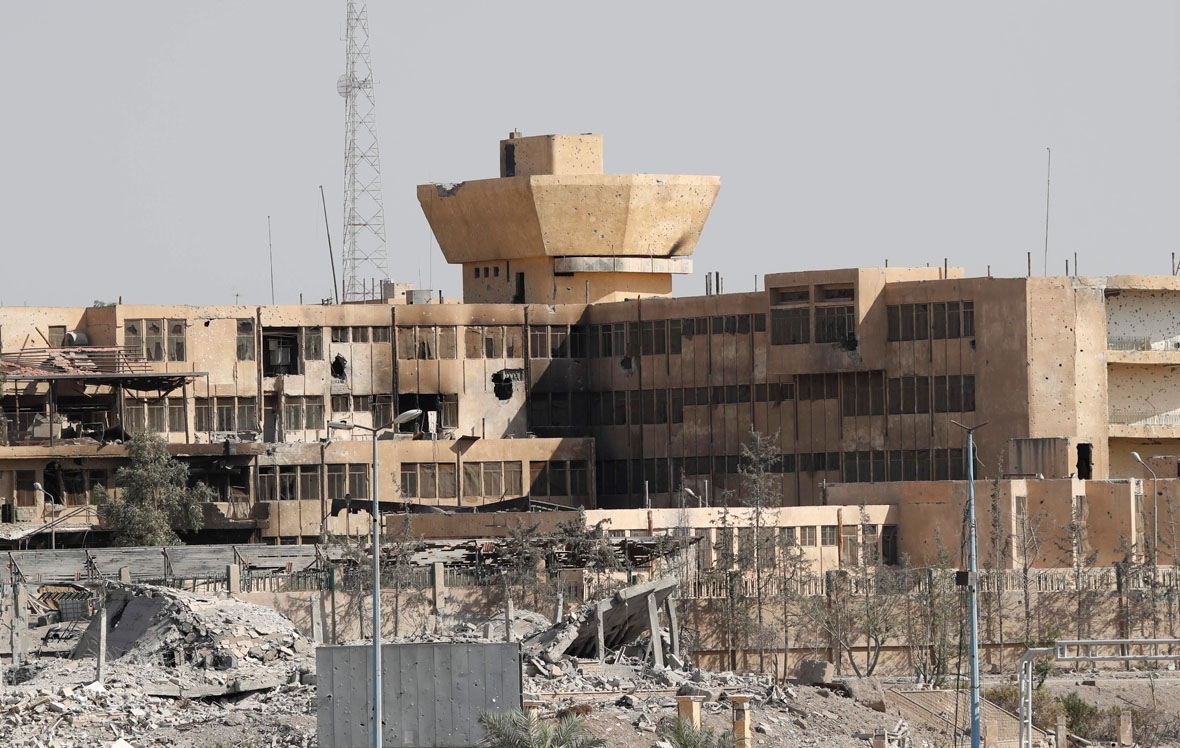Battle for Raqqa photos: Isis confined to hospital and stadium, with hostages and snipers in both
Photos of the battle for Raqqa, where the jihadists' last strongholds are a hospital and stadium, with hostages in both.
Syrian Democratic Forces (SDF) fighters have captured most of the city of Raqqa from Islamic State (Isis/Daesh) militants. The jihadists' last remaining strongholds are the central hospital and a nearby stadium – but they are holding civilian hostages in both of them, and both buildings are surrounded by snipers, booby traps and tunnels that emerge behind SDF lines.


Raqqa's hospital, a big complex pocked with bullets holes, lies just 200 yards/metres from the SDF's frontline base. Beyond it is a roundabout where the jihadists once displayed the heads of their enemies, crucified people and held military parades at the height of their expansion.
Commanders say seizing these and the stadium from the few hundred remaining militants is the end goal in the battle for Raqqa.
The two SDF commanders estimated there were no more than 350 militants left in Raqqa and said these were not the elite of the group. Many leaders are believed to have fled to Deir al-Zor where the SDF and Syrian government forces are pressing competing offensives against Isis.
However, the SDF faces a tough final showdown, as Isis slows down the SDF advance using tactics seen in the end stages of the battles for other cities such as Mosul.
"There are many civilians being held. We can't use heavy weaponry or air strikes around the hospital or stadium, so we'll encircle them as we advance," commander Haval Gabar told Reuters at their base, a home that SDF units captured a week before.
"The hospital will be the last point (in Raqqa) to be freed," he said, as bullets coming from the sprawling medical complex whizzed over the base.





"There have been many attacks from behind us" with militants launching surprise raids from a network of tunnels they dug after marauding through swathes of Syria and Iraq and capturing Raqqa in 2014, he said. "When that happens we divert forces from frontline assaults to deal with the infiltration."
The home the SDF is using as a base had an Isis tunnel emerging into its living room – now blocked up with furniture. Commander Zilzal Tarhams said militants emerged from a second nearby tunnel two days before and fired a rocket into a house occupied by the SDF. "If we find tunnels we usually cave them in with explosives. There are so many," he said.





Other tactics the jihadists were using to slow SDF advances include laying booby traps, Tarhams said. "They put mines under rugs in homes and use motion sensors to set off bombs. It's a huge obstacle."




Gabar, who directs fighting on the western front, said forces were waiting for the order for a final push, after which the roundabout, stadium and hospital would quickly fall. "When we begin it will be quick, maybe 10 days or so," he said. Tarhams predicted the battle would take a week.
"It's really because of the civilians' presence that it's taking us some time," Gabar said. There were thousands of residents still trapped in the city, including an unknown number at the stadium and hospital, he said.
Gabar and Tarhams did not say how the SDF planned to capture the stadium and hospital – both of which provide high vantage points over the city centre – while avoiding the deaths of the hostages being held there.
The commanders told Reuters they were keen to capture the last strategic sites as soon as possible. "We want to finish before winter – bad weather makes it harder to advance," Gabar said. "We'll need months to fully clear the explosives afterwards - that's going to be an even bigger job."
The SDF, an alliance of Kurdish and Arab militias dominated by the Kurdish YPG, has been fighting since June to drive Isis from Raqqa, backed by air strikes and special forces from a US-led coalition.





Islamic State leader Abu Bakr al-Baghdadi commanded his militants not to negotiate or surrender in an audio message released on Thursday (28 September). In the recording, Al-Baghdadi exhorted his followers across the world to wage attacks against the West and to keep fighting in Iraq, Syria and elsewhere. This was his first purported audio communication in almost a year during which his jihadist group lost much of its self-proclaimed "caliphate".
The message came after several reports Baghdadi had been killed. His last recording was in November 2016, two weeks after the start of the battle to recapture the city of Mosul. The date of the 46-minute recording, released via the Al-Furqan news organisation, was not clear. But in it, Baghdadi makes an apparent reference to recent events including North Korean threats against Japan and United States and the recapture of Mosul by US-backed Iraqi forces in July.
Baghdadi also called for attacks on Western media, saying: "Oh soldiers of Islam in every location, increase blow after blow, and make the media centres of the infidels, from where they wage their intellectual wars, among the targets."
Since Baghdadi proclaimed the caliphate stretching across Iraq and Syria in 2014, Iraqi forces have retaken a string of cities in western and northern Iraq including Mosul, where Baghdadi made his announcement from the city's El Nuri mosque.
© Copyright IBTimes 2025. All rights reserved.






















